How to Stay Committed to Recovery with Group Counseling

Understanding the Power of Group Counseling in Addiction Recovery
Recovery from substance use disorder is a challenging journey that requires ongoing effort and support. Group counseling emerges as a vital component in maintaining long-term sobriety, offering a nurturing environment where individuals can connect, learn, and grow together. This article explores how group therapy enhances motivation, accountability, and resilience, helping individuals stay committed to their sobriety goals while providing practical strategies and resources for sustained recovery.
The Foundations of Effective Group Therapy in Addiction Recovery
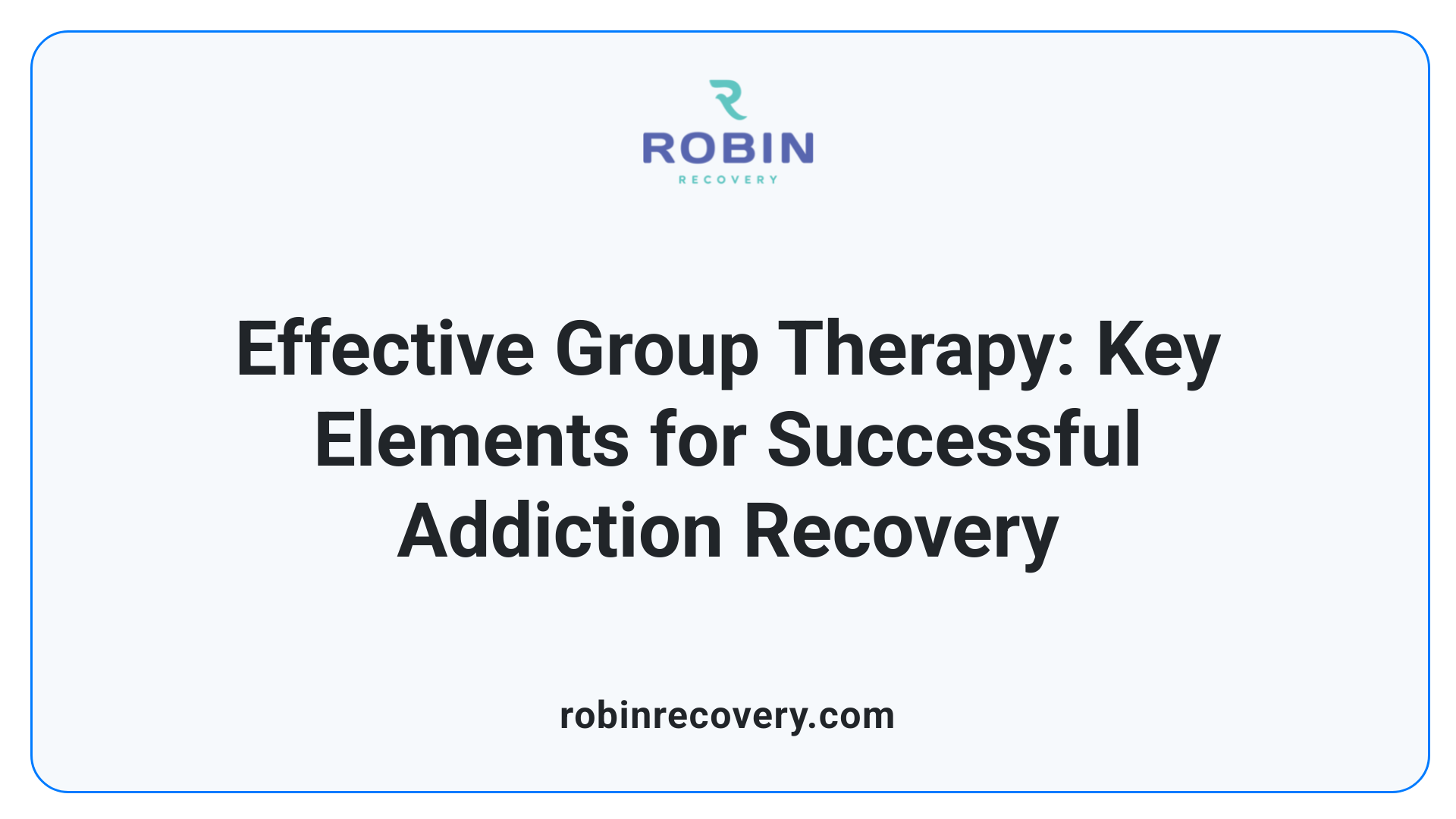
What are the benefits of participating in group therapy for addiction recovery?
Participating in group therapy offers many advantages for individuals working through addiction. It creates a sense of community and belonging, which helps combat isolation often experienced during recovery. Sharing experiences with peers provides emotional support and reassurance that one is not alone in struggles.
Group therapy also enhances motivation through peer pressure and mutual encouragement. Watching others succeed fuels hope, while collective accountability helps individuals stay committed to their goals. These settings promote learning and practicing new coping strategies, social skills, and relapse prevention techniques, all within a safe environment.
Feedback from peers can correct distorted self-beliefs and foster psychological growth. Moreover, group sessions teach individuals to handle relational issues, which are often linked to substance misuse. Collectively, these benefits contribute to higher treatment engagement, lowered relapse chances, and long-term sobriety success.
Types of group therapy models (psychoeducational, skills development, relapse prevention, support groups)
Various group therapy formats serve different needs in addiction recovery. Psychoeducational groups focus on teaching members about addiction, the effects of substances, and recovery principles. Skills development groups aim to build practical social, emotional, and coping skills necessary for maintaining sobriety.
Relapse prevention groups are tailored to help individuals identify high-risk situations and develop strategies to manage triggers effectively. Support groups, such as 12-step programs like Alcoholics Anonymous or Narcotics Anonymous, provide ongoing peer-led encouragement and accountability.
Key elements like group cohesion, therapeutic alliance, skilled facilitators
Successful group therapy depends on fostering a strong sense of cohesion, where members feel connected and accepted. The therapeutic alliance between facilitators and participants is crucial—trainers must be culturally competent, empathetic, and skilled in managing group dynamics.
Facilitators guide discussions, ensure all members are engaged, and promote a safe environment for sharing. Techniques like encouraging interaction, providing constructive feedback, role-playing, and reflective listening deepen trust and engagement.
Matching group models to clients’ stages of change and cultural needs
It's important to tailor group therapy models to match individual clients’ stages of change—whether they are contemplating change, preparing, or maintaining sobriety. Matching the intervention type increases relevance and motivation.
Cultural responsiveness is also vital. Culturally specific groups or those incorporating expressive arts can provide additional bonding and support for diverse populations. Skilled leaders who understand the cultural background of members can enhance trust and participation, thereby improving treatment outcomes.
Strategies to Maintain Motivation and Commitment in Group Settings
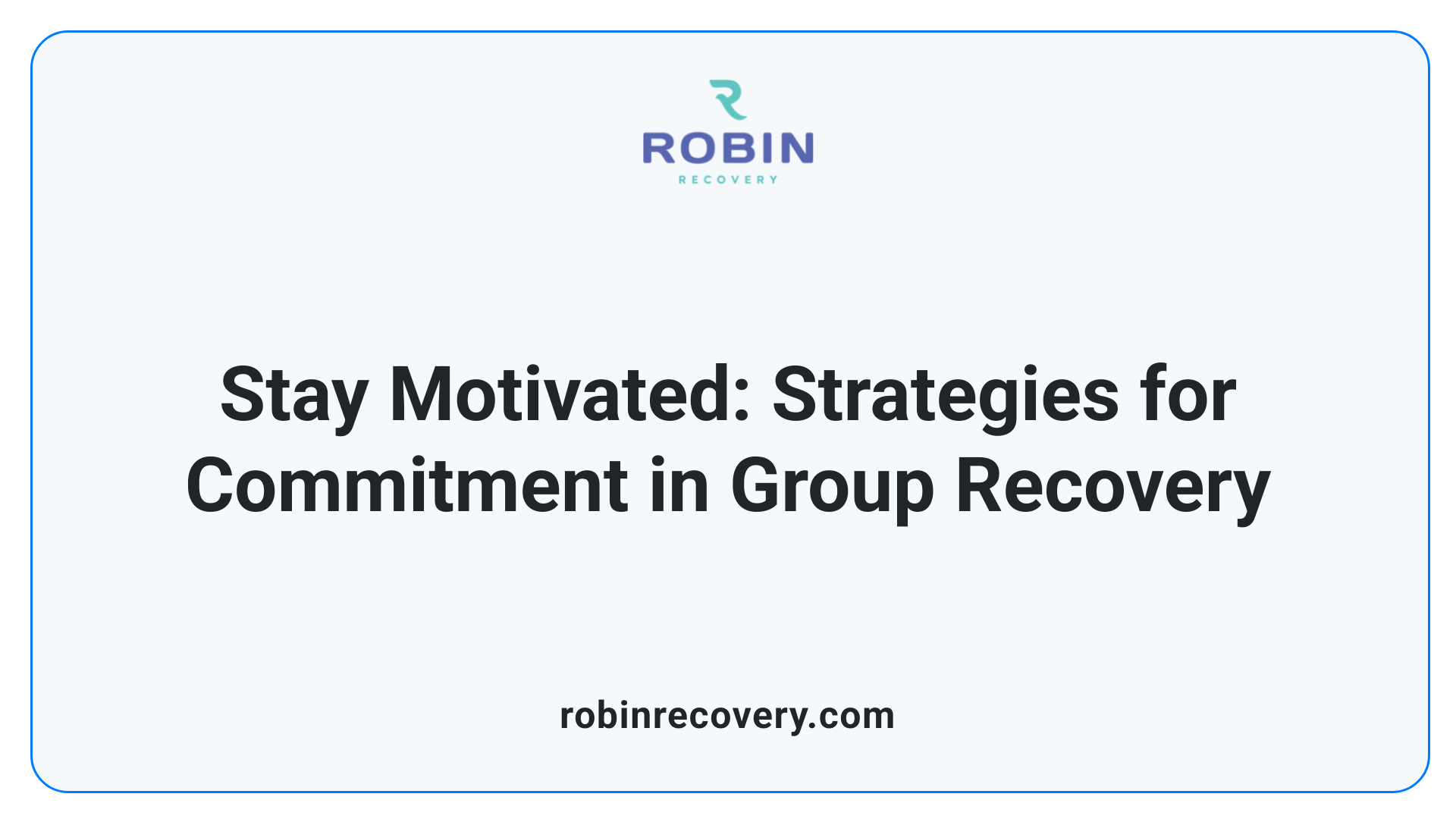
How can group counseling support long-term recovery and relapse prevention?
Group counseling is a vital component of long-term addiction recovery. It offers a supportive environment where individuals can connect with others facing similar challenges, which reduces feelings of isolation and stigma. Through shared experiences, members develop a sense of community and accountability that can motivate sustained sobriety.
One of the key benefits of group therapy is witnessing peers’ progress, which fuels hope and reinforces the possibility of recovery. Hearing success stories and observing others’ behavioral changes can inspire participants to stay committed to their own recovery paths. Additionally, group sessions teach practical coping strategies and relapse prevention techniques, empowering members to handle high-risk situations more effectively.
Group counseling also provides a platform for emotional expression, helping members deal with underlying issues such as depression, shame, or trauma that may threaten their sobriety. Facilitated by trained professionals, these groups encourage honest dialogue and skills development, including communication, problem-solving, and emotional regulation.
Research consistently shows that participation in peer support groups increases treatment engagement and retention. It enhances motivation by fostering social bonds and a sense of responsibility towards the group. These relationships serve as an ongoing source of encouragement, advice, and accountability.
Ultimately, group therapy supports long-term recovery by creating a durable network of social support, inspiring hope, reinforcing healthy habits, and helping members navigate setbacks and challenges. The collective experience within these groups builds resilience and establishes a foundation for sustained sobriety and relapse prevention.
Strategies to stay committed in group settings
To maximize benefits, individuals should attend sessions regularly, actively participate, and build supportive relationships with peers. Setting achievable goals within the group context, celebrating milestones, and practicing skills learned during sessions further foster motivation.
Engaging in activities like role-play, shared problem-solving, and expressive arts during therapy enhances skills and emotional connection. Cultivating group cohesion, where members feel safe and valued, depends heavily on a skilled facilitator who encourages inclusivity and cultural sensitivity.
Addressing cultural factors and stigma within the group is essential. Culturally adapted groups or those that acknowledge specific backgrounds can deepen trust and engagement. Open discussions about stigma and societal expectations help normalize recovery challenges and promote ongoing dedication.
In conclusion, active involvement in group therapy not only provides social support but also offers tools and motivation necessary for enduring sobriety. Building solid peer connections and fostering a cohesive, culturally sensitive environment are crucial for long-term recovery success.
The Role of Support Systems and Peer Support in Recovery
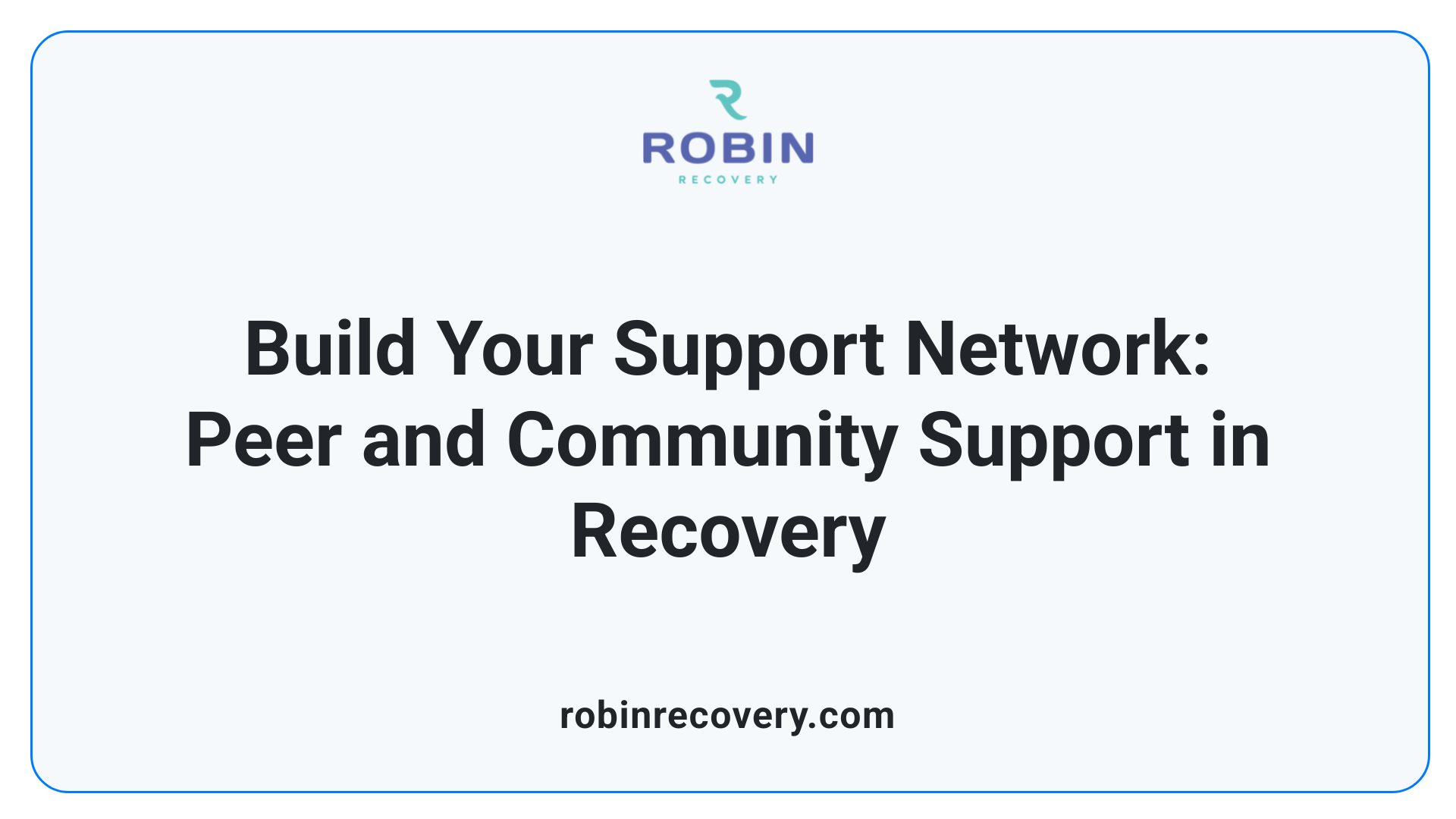
What is the role of support systems and peer support in addiction recovery?
Support networks are fundamental to successful addiction recovery. They offer emotional encouragement, practical help, and a shared sense of understanding among individuals on similar paths. Having trusted family members, friends, or members of recovery communities provides a vital foundation for staying committed.
Peer support specifically involves individuals with lived experience of addiction and recovery who serve as guides and mentors. These peer specialists understand firsthand the challenges faced during recovery and can motivate others, help them navigate setbacks, and share coping strategies.
Building social networks helps individuals feel less isolated and more connected. These connections offer emotional encouragement and accountability, which are critical during difficult times in recovery.
Accessing community resources like SAMHSA’s National Helpline, aftercare programs, sober living environments, and local support groups can significantly bolster recovery efforts. These resources provide ongoing support, guidance, and access to treatment and peer-led activities.
Participation in support groups such as 12-step programs or culturally specific groups creates safe spaces for sharing experiences. Such interactions promote hope, resilience, and commitment to sobriety.
In summary, support systems and peer support are vital in fostering emotional well-being, providing practical assistance, and reinforcing motivation. Their integration into recovery strategies enhances engagement, reduces relapse risk, and aids in community reintegration, making long-term sobriety more attainable.
Evidence and Effectiveness of Group Therapy in Addiction Treatment
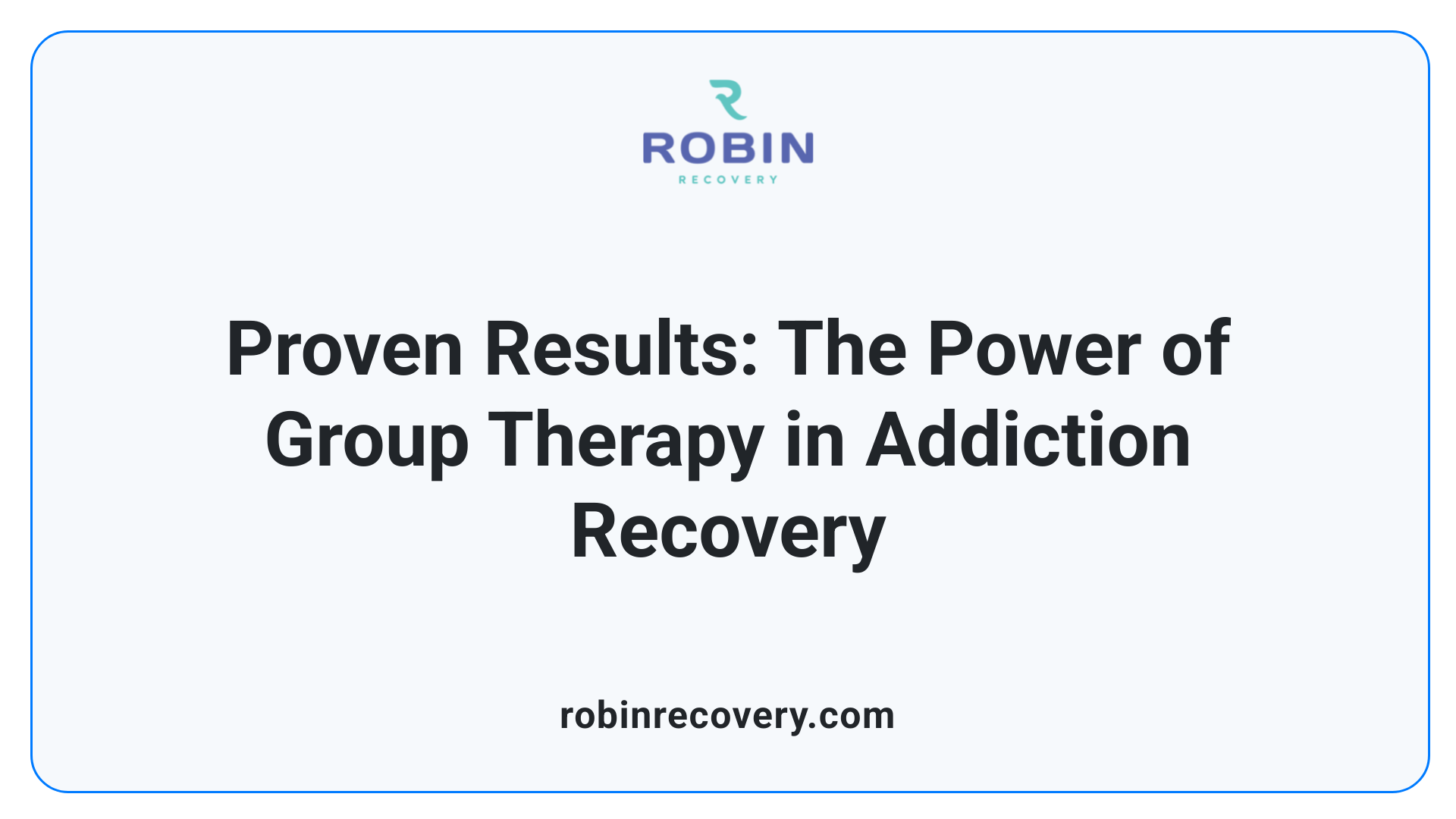
How effective is group therapy for addiction treatment?
Group therapy is widely recognized as an effective treatment modality for substance use disorders. Over 93% of treatment facilities incorporate group counseling into their programs, highlighting its importance and acceptance in the field.
Research consistently shows that group therapy achieves results comparable to individual therapy. Participants often experience improved retention in treatment, a reduction in substance use, and higher rates of long-term abstinence. The communal aspect of group therapy provides emotional support, shared experiences, and peer accountability, all of which play vital roles in sustaining recovery.
The success of group therapy hinges on strong relationships within the group, particularly group cohesion and therapeutic alliance. These elements foster trust and safety, encouraging open communication and deeper engagement.
Several models are used to tailor group therapy to specific needs, including cognitive-behavioral therapy (CBT), interpersonal process groups, expressive arts therapy, and psychoeducational groups. Each model offers unique strategies to help clients develop coping skills, manage triggers, and navigate recovery phases.
Overall, group therapy not only supports emotional and social aspects of recovery but also proves to be a cost-effective way to reach and help many individuals simultaneously. When combined with other treatments such as individual therapy, medication, and aftercare, it significantly enhances the chances of sustained sobriety and resilience.
The 7 R's of Recovery as Principles for Long-term Sobriety
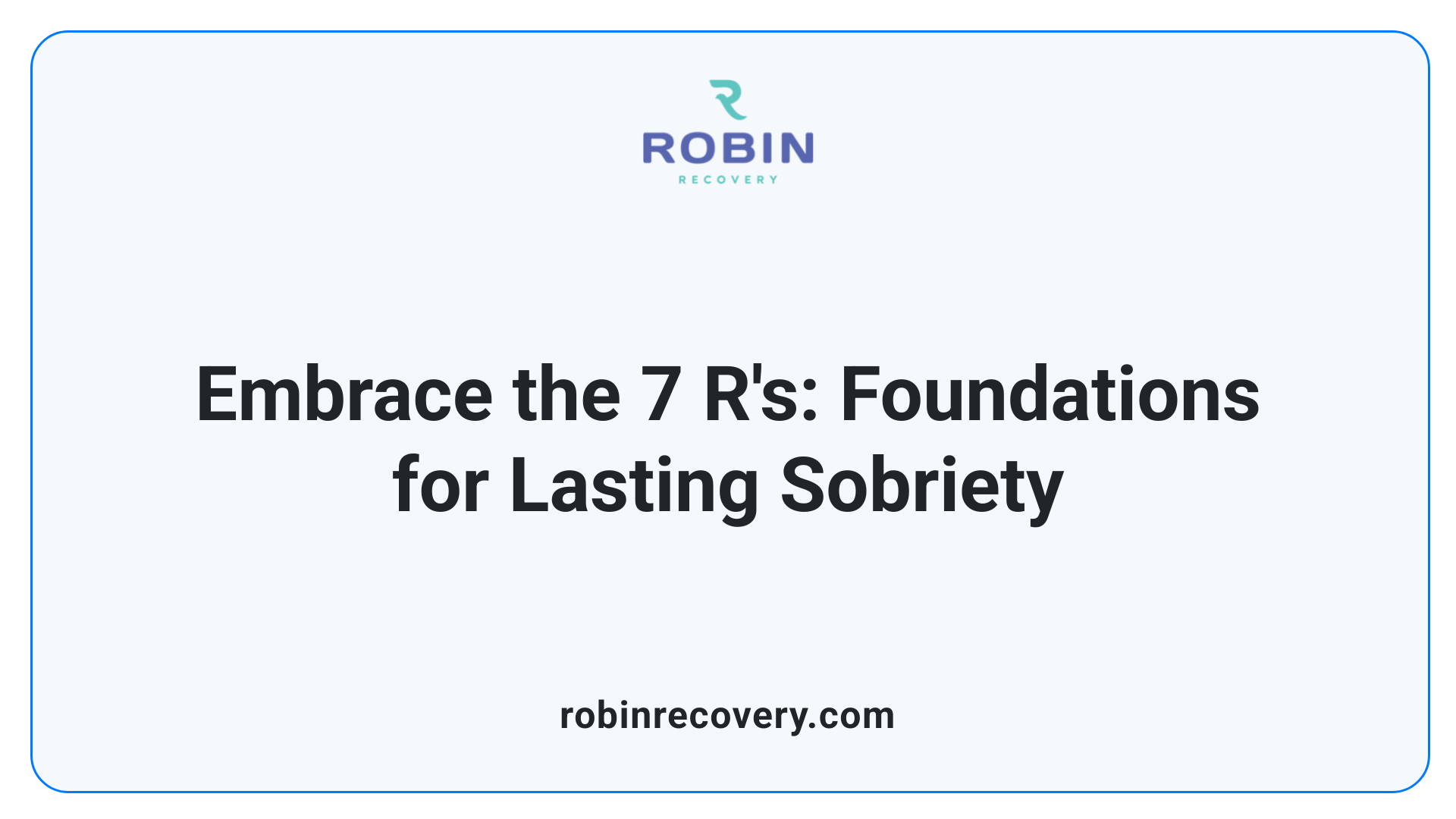
What are the 7 R's of recovery and how do they support sustained sobriety?
The 7 R's of recovery—Recognition, Responsibility, Reconnection, Restitution, Recovery Planning, Relapse Prevention, and Reconnection—serve as guiding principles that foster a strong foundation for lasting sobriety.
Recognition involves acknowledging one’s addiction and understanding its impact. This self-awareness is essential for initiating change and embracing recovery.
Responsibility emphasizes owning one's actions and actively participating in treatment and recovery efforts. Taking responsibility empowers individuals to make positive choices.
Reconnection is about rebuilding relationships with family, friends, and support networks. Strong social bonds are vital for emotional support and motivation.
Restitution encourages repairing harm caused by addictive behaviors, which can include making amends to those affected. This promotes healing and accountability.
Recovery Planning is the process of setting realistic goals and developing a personalized plan that includes ongoing therapy, support groups, and relapse prevention strategies.
Relapse Prevention focuses on identifying high-risk situations and implementing coping strategies to maintain sobriety over the long term.
Together, these principles help individuals develop resilience, foster personal accountability, and strengthen social support systems, all of which are critical in maintaining lasting sobriety. Adopting the 7 R's supports a structured, holistic approach to recovery that addresses emotional, behavioral, and social factors, promoting a healthier, substance-free life.
Empowering Long-term Sobriety Through Ongoing Support and Group Engagement
Maintaining sobriety is a continuous journey that benefits immensely from consistent support, structured group therapy, and a resilient mindset rooted in shared experiences. By actively engaging in group counseling, building supportive relationships, and practicing personal strategies like goal setting and mindfulness, individuals strengthen their commitment to recovery. Resources such as helplines, aftercare programs, and sober living environments further bolster these efforts. Embracing the principles of the 7 R's of recovery and fostering a strong support network reinforce long-term sobriety, making the path toward a healthier, substance-free life both achievable and sustainable.
References
- National Helpline for Mental Health, Drug, Alcohol Issues - SAMHSA
- How to Stay Committed to Sobriety | College Station, TX
- 2 Types of Groups Commonly Used in Substance Abuse Treatment
- 5 Tips To Stay Committed To Sobriety | Aftercare Program VA
- 1 Groups and Substance Abuse Treatment - NCBI
- Exploring the Power of Group Therapy for Substance Use Disorders
- Making a Commitment to Addiction Recovery
